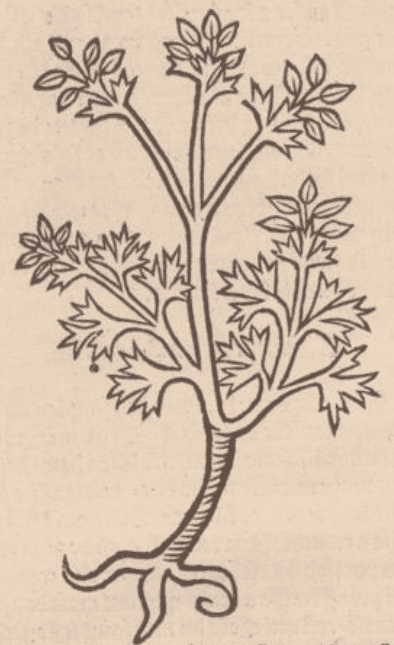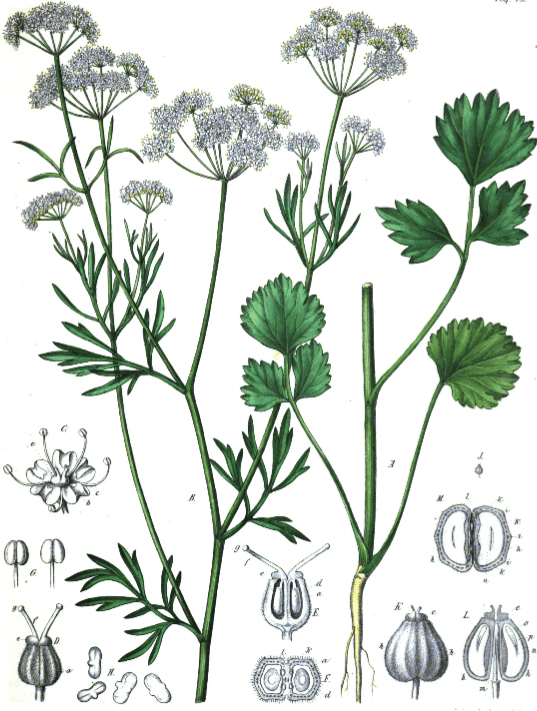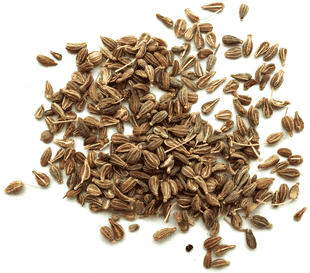Annis, Aniseed
Anisoon (Unani) Ortus sanitatis, Cube, Johann von, 1501
Ortus sanitatis, Cube, Johann von, 1501 Atlas der officinellen pflanzen (2), Felix, 1899
Atlas der officinellen pflanzen (2), Felix, 1899 Aniseed (Adam, 2016)
Aniseed (Adam, 2016)Botanical name:
Pimpinella anisum
Parts used:
Seed
Temperature & Taste:
Very Warm, dry. Pungent, Sweet.
Sweet and Bitter varieties were traditionally recognised.
“According to Galen anise is Hot in the Second and Dry in the Third degree”. (Avicenna)
Classification:
2J. RAREFYING
3C. ALEXIPHARMICS. 3H. LACTAGOGUE
4e. STOMACHIC. 4g. HEPATIC. 4i. UTERINE
Uses:
1. Warms the Kidneys, Moves Qi, Clears Cold:
-promotes Urine; cold-type Edema
-cold-type Lumbago, Leukorrhea
-Obstructions of the Kidneys
-older Herbals listed it to ‘Promote Lust’ and ‘Stir up Courage’.
-promotes Menstruation and facilitate Childbirth
-constant eating increases complexion
2. Warms the Stomach and Intestines, Moves Qi:
-Wind, Colic
-Cold-type Pain of the Lower Abdomen
-obstructions of the Liver; it warms Liver and strengthens the Liver role in digestion
-Hernia of the lower abdomen associated with Cold and Wind
-stops rising Qi of the Stomach coming from Cold: Hiccups, Belching, Vomiting
3. Warms the Lungs, Clears Cold Phlegm, Stops Cough:
-continual and spasmodic Cough, Bronchitis, Whooping Cough,
–with Honey ‘cleanseth the breast very much from phlegmatic superfluities’ (Gerard)
-some preferred toasting the seeds for Cold Phlegm obstructing the Lungs
-“facilitates the Respiration”. (Avicenna)
4. One of the Warm Seeds:
-used in various Warming formulas
-clears Cold, Warm the Yang, regulate Qi
5. Settles Wind, Stops Spasms:
-Vertigo, Headache, Migraine, Epilepsy in Children
–Salmon said ‘Aniseeds are a certain specific in the loosening of a contracture in any part of the body, comforting the nerve by its gentle heat, suavity and sweetness’.
-“The smoke, arising from Anise when placed on fire, gives relief against headache and vertigo”. (Avicenna)
6. Promotes Milk
-promotes Milk and increase quality, especially in a cold constitution
-oil of Anise promotes abundance of Milk (Botanicon Continens Herbarum, Theodore Dorsten, 1540)
7. Resists Poison:
-“removes the poisonous effects of Insect Bites” (Avicenna)
-“It is good against the Poison of Beasts”. (Turners Herbal)
-“Useful for Chronic Fever”. (Avicenna)
8. Externally:
-Used externally for scabies and lice etc. (Oil)
-The seeds were bruised, made into a plaster, and applied to bruises and swellings. (West, Ayurveda)
-seeds have been smoked as an expectorant.
-leaves applied topically remove Freckles.
-applied to swellings of the Testicles.
-“useful for chronic Vascular Keratitis”. (Avicenna)
–Seed is useful for Cataract (Ayurveda)
Dose:
Powder: 500mg–3 grams;
In brief Decoction or Infusion: 2–6 grams (up to 9 grams)
Substitute:
1. Fennel, Caraway
2. Star Anise
Corrective:
Avicenna listed Fennel as a corrective.
Preparation:
1. Sometimes Aniseed was toasted. This reduces the dispersing nature while increasing the warmth and dryness. Used for Cold Phlegm of the Lungs and Dysentery.
Main Combinations:
Annis & Licorice
Annis & Thyme
1. Cough:
i. Cold-phlegm type Cough, Aniseed with Licorice
ii. Chronic Cough, Aniseed with Bitter Almond
iii. Aniseed, Licorice (1 part each), Marshmallow root (2 parts). Form an Infusion. (Sobernheim, 1840)
iii. Aniseed with Fennel seed, Licorice, Marshmallow
iii. Cough from weakness, Aniseed with Fennel seed, Licorice, Maidenhair, prepared Fox Lungs (Pharmacopoeia Generalis, 1783)
2. Cold Phlegm of the Lungs and Stomach, Aniseed with Licorice, Mastic, Caraway, Fennel seed, Galangal, Cinnamon, Pepper, Pyrethrum, Cardamon (as in Dianisum)
3. Chronic Lung Catarrh with Cold Phlegm, Aniseed with Polypody, Bittersweet (Sobernheim, 1840)
4. Wind, Colic, Wind and Spasms of the Stomach or Intestine
i. Aniseed is often combined with Fennel
ii. Aniseed with seeds of Dill, Fennel, Coriander, Caraway (Pharmacopoeia extemporanea, Augustin, 1822)
iii. Aniseed with Fennel, Caraway, Coriander seed, Orange peel, Ginger (Dispensatorium medico pharmaceuticum Palatinatus, 1764)
iv. Aniseed with Marshmallow, Fennel seed, Coriander seed, Rue, Pennyroyal (Memorial Pharmaceutique, 1824)
5. Nausea, Vomiting and Indigestion from Cold Stomach:
i. Aniseed with Ginger, Costus
ii. Aniseed with Cinnamon, Ginger
6. Digestive Powder, Aniseed with Juniper, Calamus, Elecampane, Orris (Memorial Pharmaceutique, 1824)
7. Sour belching from Stomach cold, Aniseed, Mastic, Cinnamon (Botanicon Continens Herbarum, Theodore Dorsten, 1540)
8. Epigastric pain from Cold with Qi and Blood stagnation, Aniseed with Galangal and Corydalis Yan Hu Suo.
9. Liver obstruction, Aniseed with Agrimony, Wormwood, Bitter Almonds
10. Spleen obstruction, with Scolopendra (Botanicon Continens Herbarum, Theodore Dorsten, 1540)
11. To benefit Eyesight, Aniseed with Fennel seed, Valerian, Cinnamon, Wood Lice (Pharmacopoeia Generalis, 1783)
12. Spasms and contractures of the sinews, Aniseed oil in Sweet Almond oil topically
13. Lower abdomen pain from Cold, Aniseed with Cinnamon and Costus
14. Lower back pain from Kidney weakness, Aniseed with Fenugreek and Comfrey
15. Promote labor, Aniseed with Dill
16. To correct the Hearing, contuse Aniseed in Oil of Roses and drop into the ear.
Major Formulas:
Pectoral Powder
Powder of Anise Compound (Dianisum) (Mesue)
Compound of Turbith with Anise
Pills for Difficulty Breathing and Asthma
Cautions:
Generally Safe.
Not used in Deficient Heat (Heat associated with Yin deficiency marked by dry mouth, nightsweats, flushing etc.)
Main Preparations used:
Confection of the Seed, Distilled Water, Distilled Oil, Salt from the Ashes
1. Confected Aniseed.
It is ‘good for them which have a stinking breath, and cannot sleep; it provoketh Urine, it quenches natural Thirst, it takes away the windiness of the belly, it is good for all pains of the Stomach, against all diseases of the Liver, of the Lights, of the Matrix, and it helps the digestion. It is also good against all hoarseness, shortness of breath, and especially for all cold diseases of women, and for all them which be much plagued with the Whites. Lastly, it auments also much the Milk in women’. (Wirtzung)
2. Oleosaccharum of Anise:
i. Essential oil of Anise (1 drop), White Sugar (1 dram). Beat well together.
ii. Essential oil of Anise (0.1 part), Sugar (5 parts). Beat. (Hager’s)
3. Distilled Water of Aniseed:
i. Aniseed bruised (1 part), Water (9 parts). Macerate 12 hours, distil 6 parts.
ii. Aniseed (500 grams), Water (10 liters). Distl half. (Hager’s)
4. Spirit of Aniseed:
i. Aniseed bruised (half pound), Proof Spirit (1 gallon), Water (sufficient to prevent burning). Macerate 12 hours and distil off 1 gallon with gentle heat. (London)
ii. Aniseed bruised (250 grams), Wine Spirit (1000mls), Water (1500mls). Distil 1500mls. (Hager’s)
The Spirit is Stomachic, Cardiac, and an excellent thing against Wind, Indigestion, Griping of the Guts, Colic, and other distempers of the Bowels proceeding from Cold. It also gives relief in Asthma, Coughs, Phthisics and Shortness of Breath. It was also used to increase the Milk in nursing Mothers, as well as to facilitate Birth, and ease the Afterpains; it is also good for griping in infants. Also, it is good to be dropped into the ears for pains and noises of them.
Dose: half dram-half ounce according to Age and Strength. (Bateana, Salmon)
5. Essential Oil of Aniseed:
Aniseed, bruised 2 lbs
Fountain Water 20 lbs.
Digest 24 hours; then distil in an Alembic with its refrigeratory. Separate the oil from the water; keep the water for another distillation.
‘Being drunk or eaten fasting in lozenges in the morning, it causes a sweet breath, and is profitable for those that are short winded and cannot fetch their breath, but with great pain: it breaks wind in the Stomach, belly, and guts; it breaks Phlegm, and causes it to spit forth, it increases nature, it drives forth Poison by sweat; it comforts the Breast and Lungs, it provokes Urine, and breaks the Stone in the Reins and Bladder, it is good against the Bloody Flux and Piles. The nostrils being annointed therewith at night when ye go to bed provokes sleep, and wood being annointed therewith will not suffer moths to breed there’. (Quercetan)
‘A most excellent Pectoral, curing most diseases of the Breast and Lungs, as coughs, colds, Asthma, rawness, windiness of the Stomach, Phthisick, and indeed all diseases proceeding of cold and wind; It is often given with good success in Vertigoes, Megrims, and other diseases of the Head’. (Salmon)
‘It is very much commended in all cold diseases of the Stomach and Bowels, and particularly in windy cholics; it is no less commended for the creating an appetite, and helping digestion … they are also very proper to increase milk in nurses … and to facilitate birth’.
The Oil has also been traditionally used for Emphysema.
Dose: 2-8, or 10 drops on sugar, given in water; the stomach or navel may be annointed with the Oil, and a little may be mixed with Almond Oil and dropped into the ears for pains or noises of them.
